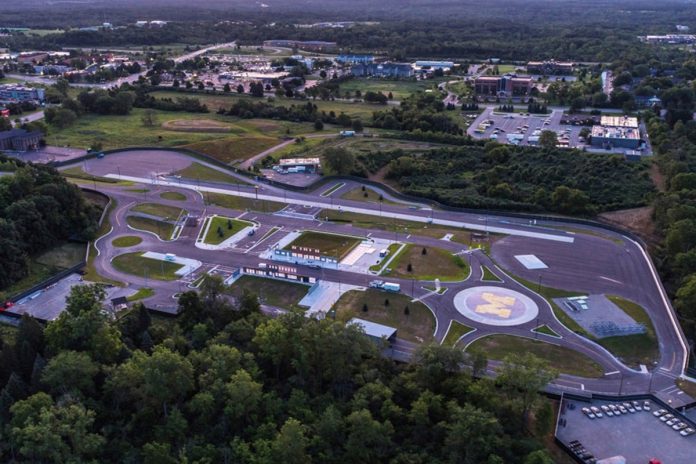MITRE, a government-sponsored nonprofit research organization, has announced a new partnership with Mcity at the University of Michigan and Nvidia to develop a virtual and physical autonomous vehicle (AV) validation platform for industry deployment.
As part of this collaboration, announced during Nvidia’s AI Summit, MITRE will utilize both Mcity’s simulation tools and a digital twin of its Mcity Test Facility, a real-world AV test environment in its Digital Proving Ground (DPG). The joint platform will deliver physically-based sensor simulation enabled by Nvidia Omniverse Cloud Sensor RTX APIs. By combining these simulation capabilities with the MITRE DPG reporting framework, the companies aim to help developers perform exhaustive testing in a simulated world, and safely validate AVs before their deployment in the real world.
MITRE and Mcity are more broadly aiming to help OEMs and AV companies navigate the regulatory environment for AVs with validation resources. Mcity operates a 32-acre mock city for automakers and researchers to test their technology, and is also building a digital framework around its physical proving ground to provide developers with AV data and simulation tools. By providing both physical and digital resources to validate AVs, MITRE and Mcity are similarly looking to offer a safe, accessible solution that addresses the complexity of verifying autonomy.
The companies highlighted that a key area of their collaboration is sensor simulation, which models the physics and behavior of cameras, LiDARs, radars and ultrasonic sensors on a physical vehicle, and how these sensors interact with their surroundings. The simulation capabilities to be offered through the new jointly developed validation platform will enable developers to train against, and test, rare and dangerous scenarios (such as extreme weather conditions, sudden pedestrian crossings, or unpredictable driver behavior) in a safe virtual setting.
MITRE and its ecosystem are actively developing the Digital Proving Ground platform to facilitate industry-wide standards and regulations. As an open and accessible national resource for accelerating safe AV development and deployment, the platform will focus on providing AV developers with a trusted simulation test environment.
Mcity will contribute to the partnership its simulation infrastructure, a digital twin, and the ability to connect virtual and physical worlds through NVIDIA Omniverse, Nvidia’s open platform that helps system developers build physical AI and robotic system simulation applications. By integrating this virtual proving ground into DPG, the collaboration will also look to accelerate the development and use of advanced digital engineering and simulation for AV safety assurance.
Mcity’s simulation tools will connect to Omniverse Cloud Sensor RTX APIs and render a Universal Scene Description (USD) model of Mcity’s physical proving ground. The DPG will then be able to access this environment, simulate the behavior of vehicles and pedestrians in a realistic test environment, and use the DPG reporting framework to explain how the AV performed in this virtual test. This testing will then be replicated on the physical Mcity proving ground, creating a comprehensive feedback loop.














